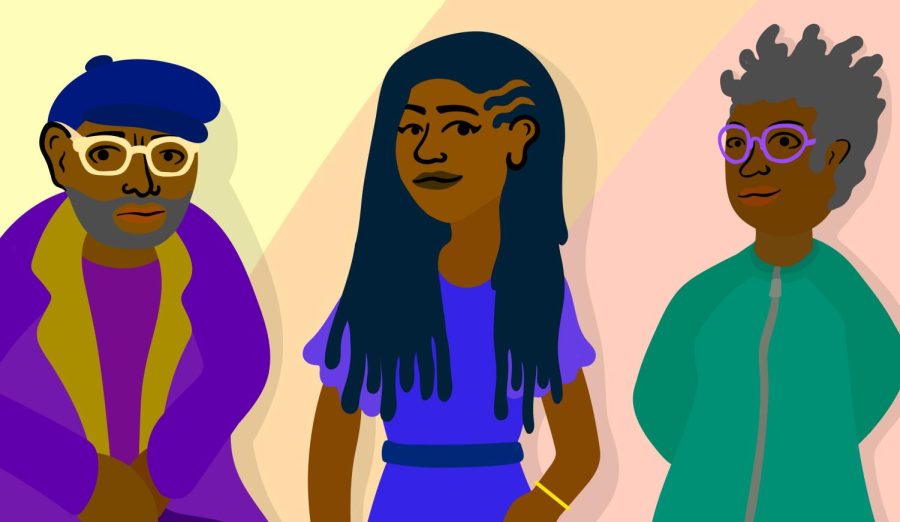OPINION: Four essential stories by Black directors
July 6, 2020
The U.S. has undergone a very tense past few months. Coronavirus, economic collapse and several instances, whether they were covered by the media or not, of police brutality against Black Americans.
There is a recent movement on social media to highlight Black creatives from all outlets, which is a noble cause because there is so much art by Black creatives that often gets swept under the rug.
In light of the recent movement to bring attention and recognition to Black art, I would like to share some of my favorite films by Black directors. Two of them are on the more obscure, arthouse side while the other two have been covered in several lists on the best movies by Black directors.
Watermelon Woman (1996) Directed by Cheryl Dunye
This is one of my absolute favorite films of all time. If you’re into film or film history, this is a must-see. Directed, written, edited by and starring Cheryl Dunye, she was the first out Black lesbian to hold all of these roles in film production.
The film encapsulated research Dunye was doing prior to production about Black actresses in the early days of cinema. These women were typecast in offensive stereotypes and left uncredited. Starring as a semi-fictional version of herself, The Watermelon Woman focuses on Dunye working at a video shop while also working on a documentary about a fictional unknown actress from the ‘30s who was only known as “The Watermelon Woman,” a stereotypical racial figure popular during that period.
It’s a remarkably funny film and very skilled in dissecting how the past era of film that was thought to be left behind still holds a heavy precedent today. The more comedic elements come in during scenes at Dunye’s day job at the video store, where her and her friend Tamara discuss their lives and their struggles of being and dating while gay. Dunye’s writing tackles this and the lack of representation for Black and gay people in films, both past, and present, and is both honest and hilarious. It’s also very timely despite the fact that it was released over 20 years ago.
Claudine (1974) Directed by John Berry
This movie, probably an early predecessor to If Beale Street Could Talk, is adorable, funny and heartwarming. Starring Diahann Carroll and James Earl Jones, it focuses on a romance between a mother of six who works as a maid and a city garbage man.
They also must navigate the welfare system, since Carole’s character could be kicked off of it if she marries Earl Jones, as it is vital to helping her six children survive. Despite this, their romance is very sweet. The soundtrack, written by Curtis Mayfield and performed by Gladys Knight & the Pips, is also a fantastic listen, both inside and outside of the film.
13th (2016) Directed by Ava DuVernay
Taking its name from the amendment that abolished slavery, 13th focuses on how the outlawing of slavery led to the prison industrial complex becoming essentially another system of oppression for the Black population in America.
The film compiles the history from the post-war environment of criminalizing minimal offenses just to arrest recently freed men, followed through the 20th century with literacy tests for voting, Jim Crow laws and the war on drugs that targeted the poor and disenfranchised during the ‘80s and ‘90s.
While going through this troubling history, DuVernay also shows the skyrocketing U.S. prison population — and we still have the highest population of prisoners in the world. She also interviews countless people, including Angela Davis, Bryan Stevenson and Henry Louis Gates Jr., collecting several personal perspectives on this barbed history, both from their youth and adult life. It is a sobering and upsetting watch but an essential part of history that needs to be discussed and displayed to all.
BlackKKKlansmen (2017) Directed by Spike Lee
Along with Do the Right Thing, these movies are probably two of the most impactful works about race in the history of film. I’m not exaggerating either. While I do love Do the Right Thing, as it is basically a beautifully directed stage play, BlackKKKlansmen is more of a cinematic take on race and covers the history of film similar to The Watermelon Woman.
The film focuses on Ron Stallworth, the first black officer hired at the Colorado Police Department in 1972 and his undercover investigation into the local Ku Klux Klan chapter. Stallworth does the over-the-phone and distanced monitoring and research while a fake white Ron Stallworth wears a wire to meetings and reports back his information. It’s incredibly funny, both from star John David Washington as Stallworth and Adam Driver as his accomplice.
The comedy mostly comes from the duo infiltrating the group and pointing out the absurdity and idiocracy of the group’s racism. Lee also discusses the then-entangled culture of the early ‘70s in a nuanced but serious manner, in which the culture was both progressing and regressing at the same time.
Contact Grace-Marie Burton at [email protected].









